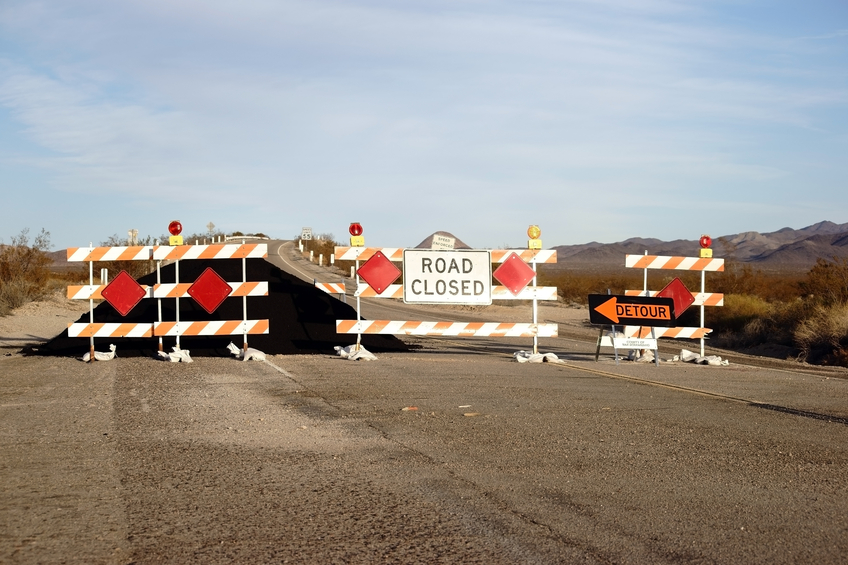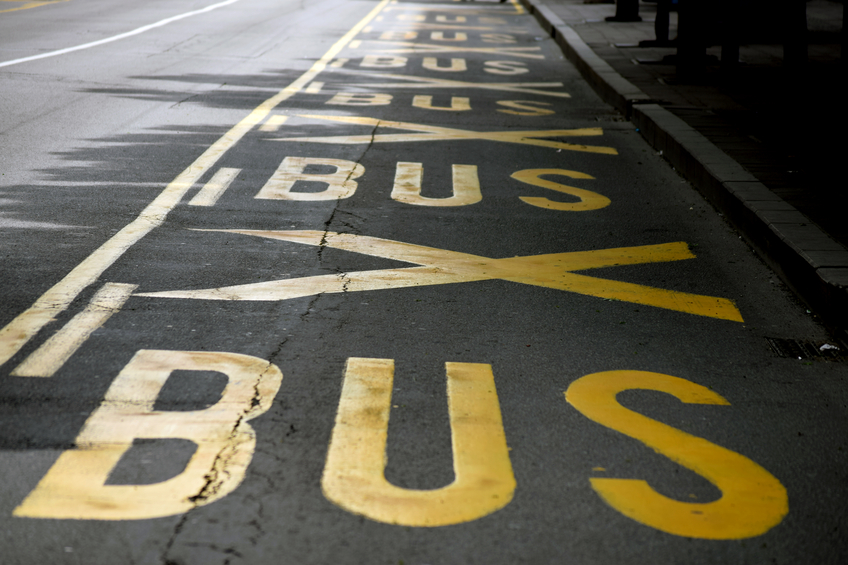New Jersey Transportation and Ethics 24 PDH Discount Package 1
Courses in this Package
Transportation Management Plans for Work Zones (C07-001)
Traffic Bottlenecks Operational Improvements (C06-018)
Low Cost Traffic Engineering Improvements (C02-007)
Impact of Exempt Vehicles on HOV Lanes (C05-012)
Effects of Traffic Calming Measures on Pedestrians and Motorists (C02-030)
Engineering Ethics for New Jersey Professional Engineers (NJ2-005)

This online engineering PDH course sets forth some basic guiding principles and describes a general approach for developing, implementing, and assessing TMPs. This course is a compendium of guidance material, available resources, and suggested practices to help develop, implement, and assess transportation management plans (TMP) for work zones.
Work zone objectives, needs, and issues vary from project to project. Therefore, it is ultimately up to the professional to establish procedures and implement TMPs that best serve the safety and mobility needs of the traveling public, highway workers, businesses, and community.
This 7 PDH online course is applicable to transportation planners, traffic engineers, agency personnel as well as design and construction personnel involved with the development, review, approval, implementation, and assessment of TMPs.
This PE continuing education course is intended to provide you with the following specific knowledge and skills:
- Understanding the purpose of transportation management plans
- Learning the process for TMP development, implementation and assessment
- Knowledge of potential TMP components
- Implementing work zone impacts management strategies
- Familiarizing with current TMP use, examples and practices
In this professional engineering CEU course, you need to review the Federal Highway Administration Publication FHWA-HOP-05-066, "Developing and Implementing Transportation Plans for Work Zones".
Upon successful completion of the quiz, print your Certificate of Completion instantly. (Note: if you are paying by check or money order, you will be able to print it after we receive your payment.) For your convenience, we will also email it to you. Please note that you can log in to your account at any time to access and print your Certificate of Completion.

This online engineering PDH course describes bottlenecks and explores near-term operational and low-cost construction opportunities to correct them.
Delays due to traffic congestion seem like an unavoidable, frustrating fact of life. Or are they—unavoidable, that is? This course focuses on traffic congestion caused by bottlenecks—which are specific locations on the highway system where the physical layout of the roadway routinely cannot process the traffic that wants to use it and results in localized, recurring congestion.
By focusing on relieving localized, recurring congestion at bottlenecks, this primer can help agencies identify the right fix for a particular bottleneck. What’s more, the right fix for a localized, recurring bottleneck is usually spot-specific, more effective, less expensive, and faster to implement than building a new facility.
This 6 PDH online course is applicable to traffic engineers and planners, conceptual and detail designers, and other technical professionals who are interested in gaining a better understanding in traffic bottlenecks operational improvements.
This PE continuing education course is intended to provide you with the following specific knowledge and skills:
- Understanding bottlenecks and congestion
- Learning about the different strategies of resolving congestion
- Knowing how to structure a localized bottleneck program
- Identifying, assessing and addressing bottlenecks
- Incorporating quick-fix bottleneck solutions into the Congestion Initiative
- Understanding how agencies are dealing with bottlenecks (case studies)
Upon successful completion of the quiz, print your Certificate of Completion instantly. (Note: if you are paying by check or money order, you will be able to print it after we receive your payment.) For your convenience, we will also email it to you. Please note that you can log in to your account at any time to access and print your Certificate of Completion.

This online engineering PDH course pesents approaches that have been implemented to provide low cost solutions for improving safety and traffic flow. This course is designed to provide insight on the subject of low cost traffic engineering improvements. The goal is to provide practicing traffic engineers and planners with information describing the types of low cost actions that have been implemented, along with their cost and benefits.
The research results presented in this course are based on a review of the literature as well as interviews with transportation agency staff throughout the nation. The results identify a series of successful and effective low cost strategies that agencies have implemented to improve safety and reduce traffic congestion.
This 2 PDH online course is applicable to traffic engineers and planners as well as other transportation personnel involved in the implementation of low cost traffic engineering improvements.
This PE continuing education course is intended to provide you with the following specific knowledge and skills:
- Types of low cost traffic engineering improvements
- Importance of low cost traffic engineering improvements
- Benefits of low cost traffic engineering improvements
- Innovative low cost strategies
In this professional engineering CEU course, you need to review the Federal Highway Administration Publication FHWA-OP- 03-078, "Low Cost Traffic Engineering Improvements".
Upon successful completion of the quiz, print your Certificate of Completion instantly. (Note: if you are paying by check or money order, you will be able to print it after we receive your payment.) For your convenience, we will also email it to you. Please note that you can log in to your account at any time to access and print your Certificate of Completion.

This online engineering PDH course presents information on defining high-occupancy vehicle (HOV) lane capacity, options for using available HOV lane capacity, and analyzing HOV exemption policies. It examines the potential impact of certain exempt vehicles on the operation of high-occupancy vehicles (HOV) facilities. The possible exempt vehicles examined in this course include environmentally friendly vehicles, and law enforcement, emergency services, and designated public transportation vehicles. It also presents the experience with the use of HOV lanes by these types of exempt vehicles. Finally, it examines the potential issues and approaches for allowing exempt vehicles to use HOV lanes.
Traffic congestion continues to be a major issue in metropolitan areas throughout the country. The agencies responsible for the surface transportation system in these regions use a variety of approaches and techniques to address concerns relating to traffic congestion, mobility, and air quality. The use of HOV facilities represents one approach in use or being considered in many urban areas.
This 5 PDH online course is applicable to traffic engineers, transportation planners, conceptual and detail designers, and other technical professionals who will be considering HOV exemption policies as well as monitoring and evaluating the use of HOV lanes by exempt vehicles.
This PE continuing education course is intended to provide you with the following specific knowledge and skills:
- Learning about HOV facilities and HOV lane capacities
- Evaluating options for using HOV lane capacities
- Analyzing HOV exemption policies on traffic flow
- Considering HOV exemption for environmentally friendly vehicles
- Considering HOV exemptions for law enforcement vehicles
- Considering HOV exemptions for law public transportation vehicles
In this professional engineering CEU course, you need to review the Federal Highway Administration Publication FHWA-OP-05-058, "Potential Impact of Exempt Vehicles on HOV Lanes".
Upon successful completion of the quiz, print your Certificate of Completion instantly. (Note: if you are paying by check or money order, you will be able to print it after we receive your payment.) For your convenience, we will also email it to you. Please note that you can log in to your account at any time to access and print your Certificate of Completion.

This online engineering PDH course summarizes past research on speed humps, bulbouts, and roadway narrowing as well as findings from a new evaluation of bulbouts, raised crosswalks and intersections, refuge islands, and speed humps in eight communities.
Continued growth and decentralization throughout the United States have increased the number of cars on streets and highways. High traffic volumes and speeds, especially on residential streets, reduce the quality of life for residents because of concerns about safety, noise, and pollution. As a result, many neighborhood residents and local officials have expressed interest in undertaking traffic calming as a means of decreasing the cars' dominance.
Traffic calming encompasses a series of physical treatments that are meant to lower vehicle speeds and volumes by creating the visual impression that certain streets are not intended for high-speed or cut-through traffic. Thus, traffic calming can improve safety for pedestrians and reduce noise and pollution levels. Examples of these measures include bulbouts, speed humps, chicanes, and traffic circles.
This 2 PDH online course is applicable to transportation planners, traffic engineers, agency personnel as well as design and construction personnel involved with the development, review, approval, implementation, and assessment of traffic calming measures.
This PE continuing education course is intended to provide you with the following specific knowledge and skills:
- Familiarizing with the various traffic calming measures
- Understanding the effects of bulbouts, raised crosswalks, raised intersections and refuge islands
- Learning the various measures of effectiveness
- Understanding the benefits of the traffic calming measures on pedestrians and motorists
In this professional engineerng CEU course, you need to review the Federal Highway Administration Publication, FHWA-RD-00-104, "The Effects of Traffic Calming Measures on Pedestrian and Motorist Behavior".
Upon successful completion of the quiz, print your Certificate of Completion instantly. (Note: if you are paying by check or money order, you will be able to print it after we receive your payment.) For your convenience, we will also email it to you. Please note that you can log in to your account at any time to access and print your Certificate of Completion.

This online engineering PDH course presents the laws and rules of ethics and professional responsibility governing the practice of engineering in the State of New Jersey. Excerpts from Title 45, Chapter 8 of the New Jersey Statutes and Title 13, Chapter 40 of the New Jersey Regulations, which relate to the rules of profession conduct are presented in this course.
Engineering ethics is (1) the study of moral issues and decisions confronting individuals and organizations involved in engineering and (2) the study of related questions about moral conduct, character, ideals and relationships of peoples and organizations involved in technological development (Martin and Schinzinger, Ethics in Engineering).
Since engineers are faced with frequent moral and ethical dilemmas while practicing their engineering profession, this course will provide you with moral and ethical guidance in your decision making process. Most importantly, it will provide you with insight on how to conduct, respect and protect your engineering practice with the utmost professionalism.
This 2 PDH online course is applicable to Professional Engineers licensed in the State of New Jersey and who are required to demonstrate continuing professional competency in engineering ethics as a condition of their license renewal. For each renewal period, every licensee must complete twenty four (24) professional development hours, at least two (2) of which must be relative to the law and rules professional responsibility, conduct and ethics.
This PE continuing education engineering course is intended to provide you with the following specific knowledge and skills:
- Overview of the laws and rules regulating the practice of engineering in the State of New Jersey
- Understanding the roles of the New Jersey Board as well as its disciplinary authority
- Learning about engineering ethics and the laws and rules of professional conduct and responsibility
- Review of ethical and disciplinary case studies depicting various violations and their corresponding penalties
Upon successful completion of the quiz, print your Certificate of Completion instantly. (Note: if you are paying by check or money order, you will be able to print it after we receive your payment.) For your convenience, we will also email it to you. Please note that you can log in to your account at any time to access and print your Certificate of Completion.